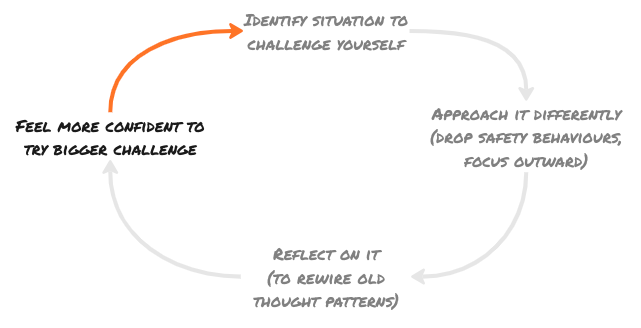Going above, beyond and overcoming it
In this final part we’ll be looking at closing the loop – how over time you’ll begin to feel more confident to try increasingly bigger challenges and opportunities to help you along the way.

As you progress on your journey with social anxiety, you may be looking for a sense of ‘completion’ or even find yourself drawn to the act of giving back to others. Especially if your group peers and facilitators have helped you grow. Perhaps you will choose to share your experiences and insights with those who are still struggling, offering them hope and guidance along the way. Or perhaps you will dedicate your time and energy to creating your own WalkTheTalk group – a supportive space where others can connect and find solace in shared understanding.
While living with anxiety is a lifelong journey and ‘completion’ is probably not the healthiest way to look at it, there are opportunities you can take to prove to yourself that you capable of anything.
Likewise, giving back to others is a powerful way to both honour your own journey and feel a sense of the highest achievement with your social anxiety. It’s also a way of challenging yourself in ways you never thought possible when you first started out. By stepping outside of your comfort zone and sharing your vulnerabilities with others, you are demonstrating the courage and resilience that you have cultivated through your own journey.
The following are ideas for ways you can feel a sense of achievement with overcoming social anxiety.
Small daily challenges to help you grow in confidence
Confidence is a key ingredient to success in all areas of life. It allows us to take risks, try new things and overcome challenges. But confidence can be difficult to build, especially if we’re struggling with social anxiety.
One way to build confidence is to do something different and new each day. This could be anything from trying a new food to taking a different route to work. By stepping outside of our comfort zone, we challenge ourselves and prove to ourselves that we’re capable of new things.
The more variability we introduce into our lives, the better. This is because variability helps to keep us engaged and motivated. It also helps us to learn and grow. When we’re constantly doing the same things, we’re not giving ourselves the opportunity to learn that we can deal with the unknown. We’re also more likely to get bored and unmotivated, making it harder to try things differently in social settings too (one of the two key unlocks to overcome social anxiety).

Greater variability is not just important for building confidence, but also for overall wellbeing. People who experience greater variability in their daily lives are happier, healthier and more resilient.
Follow our quick daily challenge email suggestions to help grow in confidence
As you challenge yourself socially, use our daily emails gives you one random thing to try each day to grow. This could be anything from trying a new meditation app to talking to a stranger. By trying new things, you’re challenging yourself and stepping outside of your comfort zone. This is how you build confidence and grow as a person.
Here are a few examples:
- Learn a new word in a foreign language.
- Cook a recipe from a different country.
- Go for a walk in a new neighbourhood.
- Take a different route to work or school.
- Talk to a stranger.
- Try a new meditation app.
- Watch a documentary on a topic you know little about.
- Try a snack you’ve never tried before.
By trying new things, you’re challenging yourself and stepping outside of your comfort zone. This is how you build confidence and grow as a person. Every small moment helps you change those gnarly, negative self-beliefs into a positive one of yourself as someone who is willing to take on new challenges.
Become a WalkTheTalk group facilitator
Amid the challenge of living with social anxiety, the prospect of leading or establishing a WalkTheTalk support group may seem daunting. However, stepping into this role can offer a profound sense of fulfilment and purpose.
By sharing your hard-won experiences and providing guidance to others, you can not only empower others but also discover a deeper sense of ‘completion’.
Taking on the role of facilitator or starting a new WalkTheTalk group presents an opportunity for you to transform your personal struggles into a driving force for positive change. By sharing your own journeys of overcoming social anxiety, you can instil hope and inspiration in others facing similar challenges.
The act of guiding and supporting others can foster a sense of competence and self-belief, empowering you to overcome any remaining self-imposed limitations.
Learn more about leading a group
Read our facilitator guide to see what it’s all about.

Decatastrophising: what if the worst case scenario occurred?
This optional experiment involves deliberately exposing yourself to the feared situation and observing what actually happens. You then compare what actually happened to your predicted catastrophic outcome.
What if the worst happened?
You’ve probably thought long and hard about what would happen if your biggest fear came true. You may have imagined the worst possible scenario and you may have convinced yourself that it’s inevitable in certain situations
But what if the worst did happen? What would really happen?
The truth is, the worst is rarely as bad as we imagine it to be. In fact, it is often much less bad. This experiment is all about simulating the worst case and experiencing for yourself what will happen.

Directions
- Choose a social situation that you are afraid of (perhaps from your social anxiety map)
- Write down the one thing you are most afraid of happening in that situation. Be as specific as possible.
For example, one situation you might fear is giving a work presentation. Your worst-case scenario might be freezing in the middle of the presentation and fearing that your colleagues will think you are incompetent. - Predict how you think people will react and what you think will happen if your worst fear comes true. How will you know how people are reacting? What visible signs will they show? Again, be as as specific as possible. Rate your confidence in each prediction on a scale of 0 to 100.
- If possible, simulate the situation. For example, if you are afraid of public speaking, pause mid-sentence in your presentation.
- After simulating the situation, go back to your predictions and revisit your scores. How much do you believe each one now?
Something missing?
If you have tips, resources or anything to add, let us know.
With thanks to all the sources referenced and linked to for producing such helpful guidance and resources available to the public and in a way that we’ve been able to use them to create the WalkTheTalk guide. Most notably OxCADAT. Any errors and omissions are our own. Please note the information provided shouldn’t be taken as medical advice. We’re a peer support group sharing content and support that we hope will prove useful. If you feel you need it, always seek professional support from your GP/the NHS and/or therapist.

